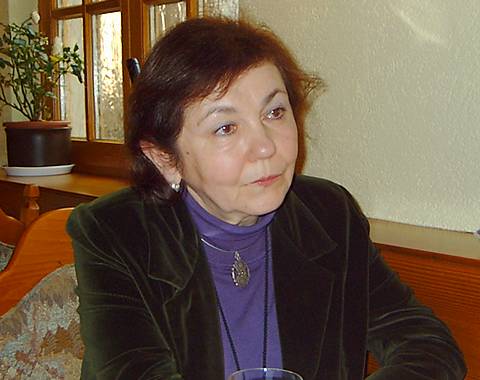|
<< -- 3 -- Tess Crebbin THE PERGAMENSCHIKOW LEGACY

So in the end there were several things that everybody agreed on: that Julian Arp is a first-rate young cellist well deserving of the scholarship, that Claudio Bohorquez is a remarkable musician whose sense of responsibility and politeness serve as an inspiration to everyone he meets, and that Boris Pergamenschikow truly took great pains in selecting his students. Seeing them perform together on the same evening, it became clear that in their own way they are all fine musicians. There was only one problem: sitting in the audience and watching the ten cellists performing together, one could not help noticing that they were all male. So the inevitable question was: why the absence of females in the final class of Pergamenschikow? Was the Russian, perhaps, a smug macho musician who believed that women could not play the cello as perfectly as men can?
'Far from it,' explains Tania Pergamenschikow. 'Boris has had many female students over the course of his teaching activity. It just happened that his final class was made up of males, but there was a very good young female cellist from Canada who was set to join his class later this year, in summer. Unfortunately, my husband did not live long enough for this.'

Tania Pergamenschikow. Photo © 2004 Phil Crebbin
|
There remained only one option: to stay on longer than planned and attend the next day's masterclasses of Bernard Greenhouse when the female cellist, Kaori Yamagami, who is Canadian and is now studying with Frans Helmerson in Cologne, was scheduled to play Rachmaninov's Op 19 in the afternoon. This is one of the most moving works written for cello and Kaori's undivided attention to the piece was thorough and resulted in a reciprocal response by her instrument, setting off on a journey into the deepest core of the work and bringing to fruition the composer's complex and challenging writing. Watching her, one felt absolutely consumed by the passion of the work and by its splendid sensitivity.
'I was a student of Boris Pergamenschikow in Kronberg in 2002 during the masterclasses', Kaori remembers. 'Since then, he was giving me private lessons and starting this semester, everything was planned that I study with him full time in Berlin. I moved to this country to study with him. He was a wonderful mentor and was almost like a father. He gave me enough inspiration over the past two years that I can use for a life-time.' The young cellist impressed enough during her masterclass to become the second award recipient that week. She was picked as the winner of the Ingrid zu Solms Cultural Prize. It will be awarded officially to her during the Kronberg Cello Festival next year in September. The prize includes some money and a concert in the Festival.
But all of that happened in the afternoon. First, however, came The Morning After (the awards), and very interesting for any cellist were some of the comments that Greenhouse made to his other students in the masterclasses that day. Enlightening also was the stamina that these young cellists displayed since it took some doing to show up for their class in the morning after a very late night out. Following the award ceremony on 21 October, the group of Pergamenschikow students, friends, family members, associates and colleagues all went out to celebrate. They took their instruments along with them and so, on entering the restaurant, one was greeted by ten celli taking up residence by the bar and having an evening out. Towering on the wall was a huge picture of the great master himself and at the tables that took up an entire section of the restaurant the tension finally left the musicians and they headed full-on into a celebration of their successful concert evening and of Julian Arp's award. Rumour has it that all this went on, at least for some of them, until the wee hours of morning -- 'wee hours' meaning dawn breaking over the lovely hills and forests of Kronberg. So how exactly these young cellists managed to look quite so bright and fresh in the morning, and play with such an enormous level of concentration, remained beyond the comprehension of the older members of the group!
When it was all over and done, one was left with a warm and lovely cello-feeling because once again, the Kronberg Academy under its director Raimund Trenkler had risen to the cello-spirit and made for a truly unforgettable experience of what cello-fellowship really means.
Continue >>
Copyright © 11 November 2004
Tess Crebbin, Germany

|

